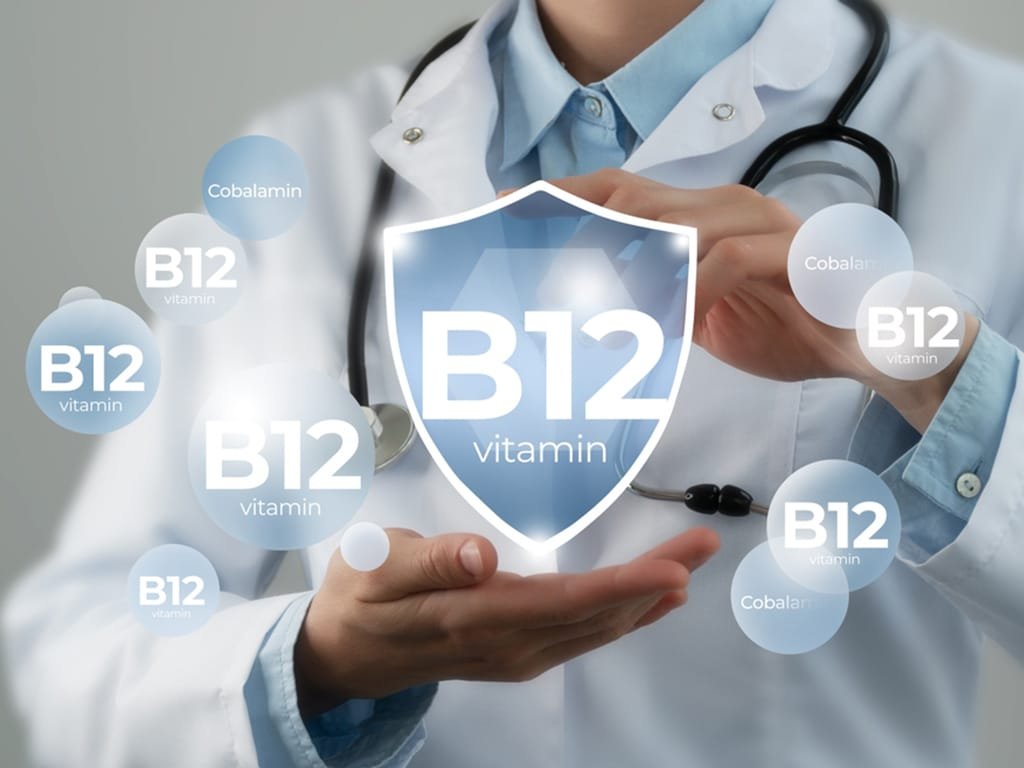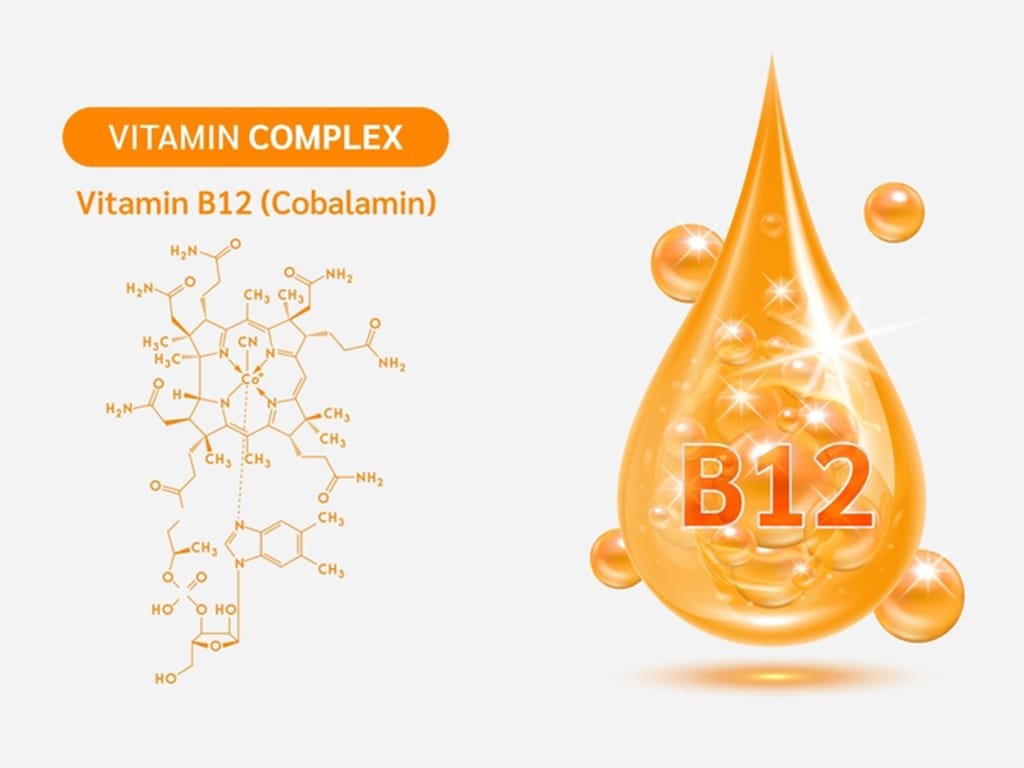The Best Fluffy Pancakes recipe you will fall in love with. Full of tips and tricks to help you make the best pancakes.
Can Vitamin B12 Deficiency Be a Sign of Cancer: Symptoms of Vitamin B12 Deficiency
Have you ever felt unusually fatigued, experienced tingling sensations in your hands or feet, or struggled with unexplained mood swings? These could be signs of a vitamin B12 deficiency, (Can Vitamin B12 Deficiency Be a Sign of Cancer) a condition that often goes unnoticed but can have profound effects on your health. But could such a deficiency be linked to something more serious, like cancer? While not a direct cause, vitamin B12 deficiency has been studied as a potential indicator of underlying health issues, including certain types of cancer.
Table of Contents
ToggleIn this blog, we’ll dive deep into the connection between ‘vitamin B12 deficiency’ and its possible links to cancer, along with a closer look at the symptoms that might signal a deficiency. From understanding how B12 supports essential bodily functions to exploring why a lack of vitamin b12 it could point to larger concerns, we’ll equip you with the knowledge you need to take charge of your health. Let’s uncover the facts about vitamin deficiency and why staying informed is crucial for your well-being!

Key Takeaways
- Vitamin B-12 deficiency can manifest in many symptoms that might lead to bigger health problems.
- Spotting these symptoms early is key to getting medical help fast.
- While it’s common to lack B12, low levels can also mean a higher risk of developing stomach cancer and serious conditions like cancer.
- Knowing how B12 helps make ‘red blood cells’ is important for understanding its role in your health.
- Acting on symptoms related to vitamin B-12 deficiency can lead to better health in the long run.
Understanding Vitamin B12 Deficiency and Cancer
Vitamin B12 is a water-soluble vitamin that’s key for our health. It helps our nerves and makes ‘red blood cells’. We get it from animal products like meat, fish, eggs, and dairy. But, some people might not get enough.
What is Vitamin B12?
This vitamin is important for making DNA and keeping nerves working right. Not having enough can cause serious problems like nerve issues and anemia. Knowing how vital vitamin B12 is helps us see why we need it.
Common Causes of Vitamin B12 Deficiency Symptoms
A ‘vitamin b12 deficiency’ can come from different things:
- Not eating enough of it, like vegans or vegetarians
- Having trouble absorbing it because of stomach problems
- Medical issues like atrophic gastritis or pernicious anemia
Some groups are more likely to have low ‘vitamin B12 levels’. This includes older adults and those on special diets. Knowing these risks helps us take steps to keep our vitamin B12 levels up.
Common Symptoms of Vitamin B12 Deficiency
Knowing the signs of ‘vitamin B12 deficiency’ is key to your health. This lack can cause physical and ‘neurological’ issues. Spotting these signs early can help fix any problems.
Physical Symptoms
Those with a B12 deficiency might feel:
- Fatigue and weakness
- Pale skin
- Shortness of breath
- Dizziness
These physical symptoms happen because the body can’t make enough red blood cells. This leads to anemia. Without enough B12, the body can’t carry enough oxygen, making you always tired.
Mental and Neurological Symptoms
B12 deficiency also affects your mind and nerves. You might notice:
- Memory loss
- Mood changes, like irritability and depression
- Nerve problems such as numbness or tingling
These ‘neurological symptoms’ can really lower your quality of life. They might seem like other health issues. It’s important to know these signs to get the right medical help.
Can Vitamin B 12 Deficiency Be a Sign of Cancer
Research is looking into how low B12 levels and hpv might raise ‘cancer risk’. It’s important to understand the link between B12 deficiency and cancer. This knowledge helps us find ways to stay healthy and prevent cancer.
Not having enough B12 can affect our health in many ways. It can weaken our immune system and mess with DNA. This is why it’s key to keep B12 levels in check.
The Link Between Low B12 Levels and Cancer Risk
Studies show that B12 is important for our body’s functions. If B12 is low, our immune system might not work right. This could make us more likely to get cancer.
B12 also helps our body make DNA. Without enough B12, our DNA might not copy correctly. This could lead to health problems.
There’s a connection between low B12 and some cancers. Some research points to:
- Increased risk of colorectal cancer
- Potential links to breast cancer
- Connections to lung cancer in certain populations
Knowing about these links helps us make better choices for our health. It’s important to understand how B12 deficiency might be linked to cancer. This knowledge helps us take care of our health better.
The Role of Vitamin B12 in Red Blood Cell Production
Vitamin B12 is key for making ‘red blood cells’. It helps these cells grow right and work well. This is important because (RBC) carry oxygen all over our bodies. If B12 levels are low, we can face serious health problems.
How Low B12 Levels Affect Your Blood Cells
Not having enough B12 can cause megaloblastic anemia. This is when blood cells are too big and don’t work right. They can’t carry enough oxygen, leading to tiredness, weakness, and trouble doing everyday things.
- Megaloblastic anemia disrupts normal cell maturation, causing the creation of oversized ‘red blood cells’.
- Inadequate (RBC) production compromises oxygen delivery to tissues and organs.
- Fatigue and weakness become increasingly common as the body struggles to maintain energy levels.
It’s important to know how B12 affects our health. This vitamin is vital for making healthy ‘red blood cells’ and keeping us well.

Neurological Implications of B12 Deficiency
Vitamin B12 is key for nerve health. Not having enough can cause serious problems. It’s not just about anemia; the nervous system is also at risk.
Damage to the myelin sheath can lead to symptoms. These symptoms can make everyday tasks hard.
Nerve Function and Symptoms of Deficiency
Feeling tingling, numbness, or trouble with coordination are signs of B12 deficiency. These happen when the nerve’s protective layer wears off. This disrupts how the brain and body talk to each other.
When nerves don’t work right, thinking can get worse. This can even raise the chance of getting dementia later on.
- Tingling or numbness in hands and feet
- Difficulty walking or maintaining balance
- Memory loss or cognitive challenges
It’s important to know how much B12 you need for your nerves. Eating right or taking supplements can help. This keeps your nervous system healthy.
Types of Cancer Associated with Vitamin B12 Deficiency
‘Vitamin B12 deficiency’ is linked to several cancers, making it a health concern. Research shows that not enough B12 can lead to certain cancers. This is because B12 is key for DNA repair and making DNA. Knowing this can help you make better food choices and get health checks.
Specific Cancers Linked to Low B12 Levels
Colorectal and breast cancer are linked to ‘low B12 levels’. B12 is vital for keeping DNA stable. Without enough B12, cells can get damaged, leading to cancer. Being aware of B12 deficiency symptoms can help find cancer early.
Understanding Stomach Cancer Risk
‘Stomach cancer risk’ goes up with chronic B12 deficiency. Conditions like atrophic gastritis make it hard to absorb B12. This creates a cycle of deficiency. Over time, it can harm the stomach lining and increase ‘cancer risk’. Knowing this can help manage your health better.
Risk Factors for Developing Vitamin B12 Deficiency
It’s important to know the risk factors for ‘vitamin B12 deficiency’ to stay healthy. A ‘vegan diet’ can be a challenge because it lacks B12 sources found in animal products. Vegans need to watch their B12 levels closely.
Dietary Considerations and Vegan Diets
A vegan diet can make it hard to get enough vitamin B complex, raising the risk of deficiency. Here are some key points:
- Vitamin B12 is mainly in animal foods, making it tough for vegans to get enough from food alone.
- Fortified foods like plant-based milk and nutritional yeast can help, but they might not be enough for everyone.
- It’s important to check your B12 levels regularly if you’re vegan, as your diet can change over time.
Other health issues and medicines can also raise the risk of ‘vitamin B12 deficiency’. Problems with absorbing nutrients, like those seen in aging or digestive disorders, can make it hard for the body to use B12. Knowing these risks can help you make better food choices and take care of your health.
How to Test Your Vitamin B12 Levels
Knowing how to test your ‘vitamin B12 levels’ is key for your health. There are several ways to check your B12 levels. If you feel tired, weak, or have ‘neurological’ problems, it might be time to get tested. These signs can help you get the help you need sooner.
Diagnostic Methods for B12 Levels
There are a few ways to test your levels of vitamin b12:
- Serum B12 Tests: These check how much B12 is in your blood.
- Methylmalonic Acid Tests: High levels of this acid can mean you’re low on B12.
- Homocysteine Level Assessments: High levels of homocysteine often show you need more B12.
Recognizing Symptoms Prompting Testing
If you see symptoms that make you think you should get tested, see a doctor. Look out for:
- Unexplained fatigue or weakness.
- Bright red, swollen tongue.
- Numbness or tingling in the hands and feet.
- Difficulty walking or maintaining balance.
Treating Vitamin B12 Deficiency
It’s important to know how to treat ‘vitamin B12 deficiency’. Working with doctors helps you find the right treatment for you.
B12 Injections Explained
B12 injections quickly add vitamin B12 to your body. They are given in a muscle and go straight into your blood. This is great for people who can’t absorb B12 well or have very low levels of b12.
Seeing your doctor regularly helps figure out how often and how much you need.
Dietary Changes for Better B12 Absorption
Eating right is key to treating vitamin B12 deficiency. You should eat foods rich in B12. Good choices include:
- Dairy products such as milk and cheese
- Meat, like red meat and poultry
- Fish, such as salmon and tuna
- Fortified cereals and plant-based milk alternatives
Changing your diet can help you get more B12. Eating B12-rich foods with folate-rich foods can help your body use B12 better. Try different foods and see what works best for you.

Conclusion
Knowing about ‘vitamin B12 deficiency‘ is key for your health. This vitamin is important for making production of red blood cells and for keeping nerves healthy. But, can it be a ‘sign of cancer? Studies show that ‘low B12 levels’ might be linked to some cancers, so it’s important to keep an eye on your levels.
By spotting the signs of ‘vitamin B12 deficiency’ and knowing its risks, you can act early. Testing your B12 levels regularly and talking to doctors can help. This can lead to changes in your diet that boost your health.
Being aware of ‘vitamin B12 deficiency’ and its effects helps you take care of your health. By paying attention to your B12 levels, you can improve your physical health. This might also lower the risk of serious diseases like cancer.
FAQ
can vitamin b12 deficiency be a sign of cancer?
Yes, studies show that low ‘vitamin B12 levels’ might raise ‘cancer risk’. This includes stomach cancer. It can harm immune function and DNA, which are key in cancer growth.
What are the symptoms of vitamin B12 deficiency?
Symptoms vary widely. Physical signs include fatigue, weakness, and pale skin. Shortness of breath is also common due to formation of red blood cells issues.
‘Neurological symptoms’ include memory loss, mood swings, and numbness. These are signs of B12 deficiency affecting the brain.
What causes vitamin B12 deficiency?
Several factors can lead to B12 deficiency. A ‘vegan diet’ often lacks B12. Malabsorption, gut disorders, and some medications also play a role.
How can I test my ‘vitamin B12 levels’?
Testing B12 levels involves several methods. These include serum B12 tests and methylmalonic acid tests. A healthcare professional can guide you based on your symptoms.
What treatment options are available for ‘vitamin B12 deficiency’?
Treatment includes b12 injections may be necessary for quick replenishment. Dietary changes are also key. Include dairy, meat, and fortified foods to boost absorption.
Who is at risk for developing ‘vitamin B12 deficiency’?
Certain groups are at higher risk. These include the elderly, those with gut disorders, vegans, and those on certain medications. Knowing these risks helps prevent deficiency.
How does vitamin B12 affect neurological function?
Vitamin B12 is essential for nerve health. It helps make myelin, the nerve sheath. Without it, you might feel numbness, tingling, and coordination problems. It could also lead to cognitive decline or dementia.
Is there a specific type of cancer linked to ‘vitamin B12 deficiency’?
Yes, research links B12 deficiency to stomach and colorectal cancers. It affects DNA repair and immune function, increasing ‘cancer risk’.



